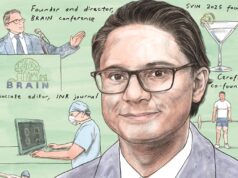
Given the potentially devastating consequences that can occur if an ischaemic stroke or acute intracranial aneurysm procedure goes wrong, an interventional neuroradiologist’s practice is inherently pressurised and extraordinarily demanding—even relative to the average physician. To gain insights on how they manage this everyday burden, Isabelle Demarre (Paris, France) conducted a survey among a number of doctors working in the interventional neuroradiology (INR) space. Here, she discusses the findings of this research and how they may be actioned moving forward.
Although severe complications or deaths are rare in INR practice, the professional and personal psychological impact has barely been studied. As such, an exploratory, qualitative, retrospective and multicentric research project was conducted using a scientific framework. Eleven French interventional neuroradiologists were interviewed including a diversity of genders and years of experience.
The results showed that, even with complications in INR practice being rare, they are difficult to bear and become a real burden over the years. During the interviews, all the interventional neuroradiologists expressed feelings such as helplessness, guilt, reduced self-confidence, and questioning of their skills. However, most of them do not want to show or express their emotions because they believe that they have neither a place in their professional environment nor in their personal one. And, occasionally, the fear of judgement can be a significant deterrent.
They seek to avoid being overwhelmed by their emotions, which become particularly strong when they put themselves in the place of the patient and/or their family—especially in the case of children and asymptomatic patients. All the interventional neuroradiologists reported experiencing the announcement of a complication as a difficult moment, particularly when they have created a certain bond and established a relationship of trust with the patient and/or their family. To cope with such situations, interventional neuroradiologists mobilise various resources and implement several strategies.
Resources and strategies
When complications occur, all the participants agreed on the importance of team support. For instance, collegial decisions help to share the responsibility of the complication and might reduce the mental load of the operator. Subsequently, case reviews and moments of conviviality are other important resources.
Similarly, team cohesion is very essential. During announcements, it helps the operator to face the patient and/or his family, and to protect interventional neuroradiologists from possible legal proceedings. Most of them highlighted the morbidity and mortality meetings, which provide a time to exchange views on the technical aspects of the complications and probably help to avoid reproducing mistakes made by others. However, while these meetings are more oriented towards facts than feelings, it is also important to share and exchange feelings in order to become fully aware of them, and to associate the emotions felt to be able to better cope with them.
Besides these resources, some interviewees were willing to participate in a professional group supervised by a psychologist, which allows them to share and express feelings about their experience. And, a few participants agreed on the importance of having private support, such as a psychologist, to have the opportunity to speak freely.
The specificity of INR practice
Contrary to other specialties, INR practice deals with acute or elective cases, and symptomatic or asymptomatic cases, as well as adults and children. It could raise different questions for the operator and, thus, lead to some psychological struggles, such as the decision of whether or not to treat or an asymptomatic patient. To intervene may save the patient’s life from the rupture of an aneurysm but may also lead to a complication causing severe disability or death. Taking this responsibility seems to be an extra weight for the operator, which increases their mental load.
In conclusion, it is essential for interventional neuroradiologists to express their emotions, either in the professional space or in their personal sphere. Doing so shall allow one to be fully aware of them, and assess and accept them. Lightening their mental load will help to alleviate the burden and may even prevent interventional neuroradiologists from experiencing burnout or post-traumatic stress.
Isabelle Demarre is a psychologist at Assistance Publique-Hôpitaux de Paris (AP-HP) in Paris, France.









